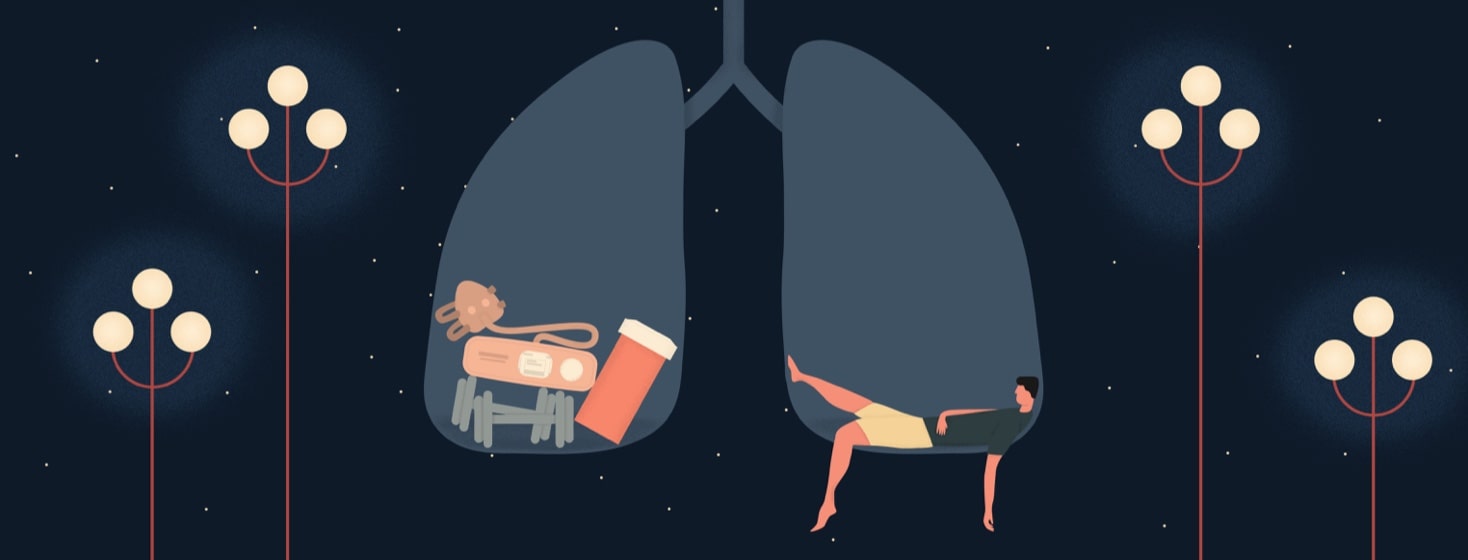Why Does COPD Cause Fatigue? What’s The Solution?
Researchers are studying our disease over time. They now understand that many people in our community suffer from weight loss and fatigue. Their goal is to understand why this is happening. Here is some of what they are learning.
Fatigue is a common symptom of COPD
Fatigue is the second-most common COPD symptom. One study showed that the most common COPD symptom is shortness of breath (dyspnea). In those with moderate to severe COPD, 50 percent said they experienced feeling fatigue.1
Very little is known about fatigue and COPD. One reason is that few experts have recognized fatigue as a symptom of COPD. Therefore, they do not ask about it on COPD surveys. Also, few studies have been done to study the effects of fatigue in COPD. The following paragraphs represent some theories on the link between COPD and fatigue.
The diaphragm become less effective
This is a result of the progression of the disease. Lung units become dilated and expand to the chest wall. They also push down on the diaphragm. This makes it so the diaphragm is less effective. The result is that the person uses other less effective muscles to breathe, such as your shoulder muscles. These muscles require more energy than usual so they poop out easily, making you fatigued.2-4
Breathing is taxing
People with COPD expend lots of energy just breathing. While resting, people with COPD use up way more energy than people without COPD. This could explain why they might experience fatigue.
A state of hypermetabolism
Some are in a state of “hypermetabolism.” This means that their bodies use up more calories than are consumed by their diets. This is the goal when you are on a diet. This is what causes weight loss. But, it’s not so good when you’re just trying to breathe. Compounding matters here is that they may feel short of breath while eating. They may stay less active just to breathe, further suppressing appetite.
Metabolizing muscles
Some people with COPD experience “muscle wasting." After a time, their bodies start metabolizing (breaking down) muscles. This is needed to generate all the extra energy needed to breathe. This causes a loss of muscle tissue and can make it even harder to stay physically active.5
Cachexia and sleep apnea
Many people with COPD have cachexia. 10-40% of people living with COPD also have a condition called “pulmonary cachexia syndrome.” This means that they are abnormally thin and may appear malnourished. This condition can make a person feel fatigued. Many people with COPD also have sleep apnea. This is a condition that causes people to have periods where they do not breathe during sleep. The wake up slightly, but not enough to be aware it is happening. This can cause a person to feel fatigued during the daytime.6
Low oxygen levels
Some people may have low oxygen levels. This can happen during a daytime activity. It may also happen during the night, especially if a person has a dual diagnosis of COPD and sleep apnea. So, low oxygen levels can make a person feel tired.6
Inflammatory chemicals
There are a variety of chemicals that cause airway inflammation. Under normal circumstances, these chemicals respond to injury and then go away. But with COPD, these chemicals increase in numbers and may even stay elevated permanently. When this happens, they may get into your blood system and become systemic which can cause damage. For instance, they may even cross the blood-brain barrier and cause changes in your brain. This may be what causes fatigue. Obviously, further studies are needed to prove or disprove this theory.7
What is the solution?
The solution at this point in time remains a mystery. Some speculate that exercise can certainly help. Exercise, or simply staying physically active, can increase your muscle tone. This can increase the strength of your muscles so they do not tire so easily which can maybe decrease your overall level of fatigue.
Supplemental oxygen can help, as low oxygen levels might be a cause of fatigue. Machines like BiPAP can help reduce the symptoms of sleep apnea. New medicines may help block the effects of inflammatory chemicals. Future medicine may help reduce inflammatory chemicals and reduce fatigue caused by them. To understand the full scope of COPD and fatigue, more studies are needed.
What about you? Do you experience COPD related fatigue? Please share your experience in the comments below.

Join the conversation